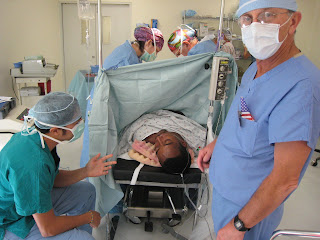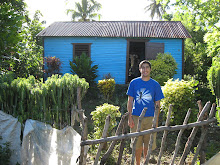The Peace Corps here in the DR publishes a magazine three times a year, called the Gringo Grita ("grita" means something like scream or yell). In the last edition, which had a man-eating mango on the cover and featured pieces about relations between Haiti and the DR and among Peace Corps Volunteers and locals, I wrote a very personal piece about some medical difficulties and how I overcame them. Enjoy.“Squish, squish,” said my stormy abdomen, churning gloriously. I winced.
“Crunch, whoosh,” it retorted. I winced again, and made a sad face.
“Squirt.” Oops.
That day’s conversation with my roiling innards was not any different than any other day for the three months following Thanksgiving. Through the smashing waves of New Years and project partner presentations of IST, I had been in constant state of disagreement with my digestive system. Perhaps, rather, it was in disagreement with me. Whatever the case, we were not on good terms. This problemita I had just would not go away. I was put on PCDR Medical cure-all, Gabbroral, twice, but to no avail. I consigned myself to twenty-seven months of internecine turmoil.
I realized it didn’t have to be like that. I could live an ordinary life, eating all the platano sancocha’o I could ever want. One quick call to Lisette gave me the key to potential normalcy. The Stool Sample. This was no small step. It had been offered to me before, but I was hesitant. Do my business in a cup? No thanks. I had heard from those who have had the pleasure that it was uncomfortable. I came to realize, however, that the ends justified the means. I would go through with the unpleasantries of The Stool Sample, as they were less of those than living with an internal Mount Vesuvius.
So, after I listened to my heart, I took the Caribe Tours – Arctic Express bus down to the capital for the poop procedure.
“Here you go,” Boriana said cheerily, handing over what looked to me like a cheap coffee cup in a wax-paper bag. “They don’t need that much, but try to get different bits in there for more complete test results. Also, the van to the clinic leaves the office at 7:30. If you miss that, you’ll have to take it there yourself.”
The luxe digs of Volunteers in Santo Domingo aren’t exactly the most comfortable for those with medical issues, which is probably why those poor kids get the one nice room, the Dengue Suite. Nevertheless, it being the capital, evening activities took their toll. I woke up well after the early morning pick-up. I would have to bring the sample to Clinica Abreu myself.
I walked out of room 14 and steeled myself. Wandering down the hall, I sipped a miniature plastic cup of water from the cooler, watched a bit of the mid-morning telenovela and the returned to the room. I was ready.
I removed the paper coffee cup from its protective bag and slipped into the bathroom, feeling at once terrified and strangely pleased. I positioned myself in a sort of half-lean over the toilet, and awkwardly placed the cup underneath me. I tried to heed the good words of Boriana, but it wasn’t that easy. It never is. The cup was situated slightly incorrectly – I missed and might have got my hand. Within seconds and way too soon, the cup overflowed. Splatter ensued. But I had done it. I was triumphant.
My euphoria fell, after thorough hand washing, when I realized I now had to traverse downtown Santo Domingo with a cup of my own poop in my hand. I needed help, and enlisted a fellow Volunteer to take this journey with me. By the time we had crossed Bolivar, she was walking ten feet behind me. I asked her why she was so far away. The smell, she told me. I guess I had not noticed it, or not wanted to. The wax-paper bag was not a terribly good protective barrier for the outside world from my malodorous offerings. Being of good heart, my travel companion stayed with me, even as I offended the general population with my wax-paper bag (Thanks, Joanna!).
We finally reached the clinic. I took a number, sat down, and put the treasure bag under my chair. According to the number display, I knew I was going to have to wait awhile. After settling in, I realized that of all the empty seats in the nearly full waiting room, the majority was right next to me. New patients seemed to strategically place themselves as far away from me as possible, putting on sour faces and suppressing giggles. My audibly gurgling intestines probably gave me away as the source of their olfactory discomfort, overcoming even my coy smile.
My number was finally called and the clerk beckoned me into the analysis room. I had heard that the sadistic nurses make patients scoop their own poop into the machines, but thankfully these nurses had eaten their viveres that morning and were fairly cheery. I did, however, get a killer look from the nurse who had the misfortune of opening my special container. I grinned. The pleasure was all mine.
I arrived back at site the next day. The call from the medical office reported that my test results had come back negative. As much as I thought I had very close special friends living with me, the tests found no amoeba, parasite or giardia. By then, however, it didn’t matter. I was feeling better already. I had pooped in a cup, and I was cured.






 Four days after I returned to the DR, I participated in a weekend conference of volunteers from the northern valley region of the country, called the Cibao. (Thank you to those who supported this conference from the States. All of us here are very appreciative.) The conference, focusing on diversity and aptly named Celebrando Cibao, brought together two youth from each volunteer’s community (there were about 25 of us) for three days of speakers, discussions, and interactive programs. You can imagine that when I first heard about the Celebrando conference, I was pretty pumped, as I dedicated a fair amount of time at college to such activities. This is the Peace Corps’ version of YLEAD. It didn’t turn out quite the same, but it was similar in spirit, which is the important part. Sure, there were some slip-ups and last-minute cancellations, but we got the message across, more or less.
Four days after I returned to the DR, I participated in a weekend conference of volunteers from the northern valley region of the country, called the Cibao. (Thank you to those who supported this conference from the States. All of us here are very appreciative.) The conference, focusing on diversity and aptly named Celebrando Cibao, brought together two youth from each volunteer’s community (there were about 25 of us) for three days of speakers, discussions, and interactive programs. You can imagine that when I first heard about the Celebrando conference, I was pretty pumped, as I dedicated a fair amount of time at college to such activities. This is the Peace Corps’ version of YLEAD. It didn’t turn out quite the same, but it was similar in spirit, which is the important part. Sure, there were some slip-ups and last-minute cancellations, but we got the message across, more or less.








